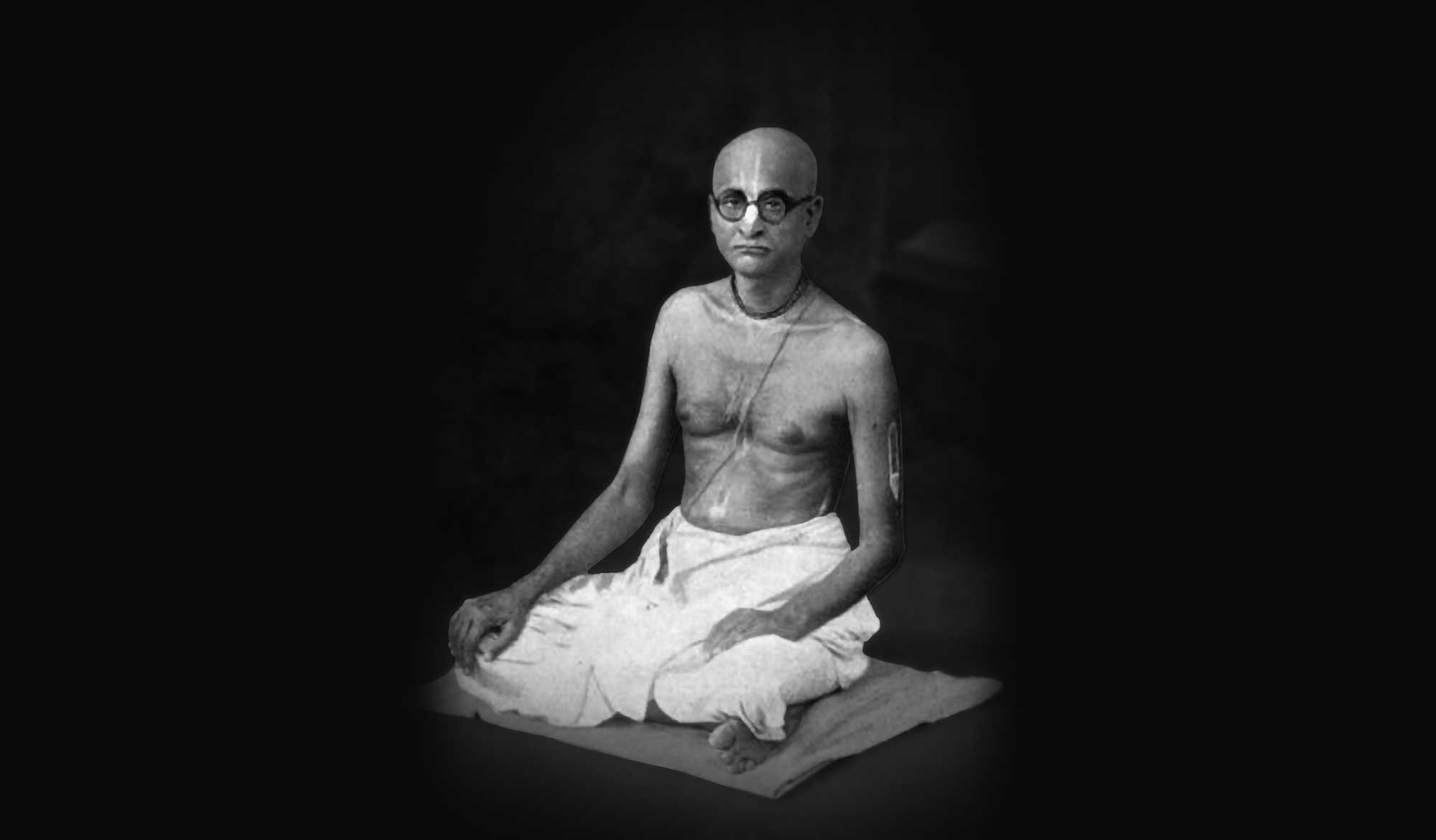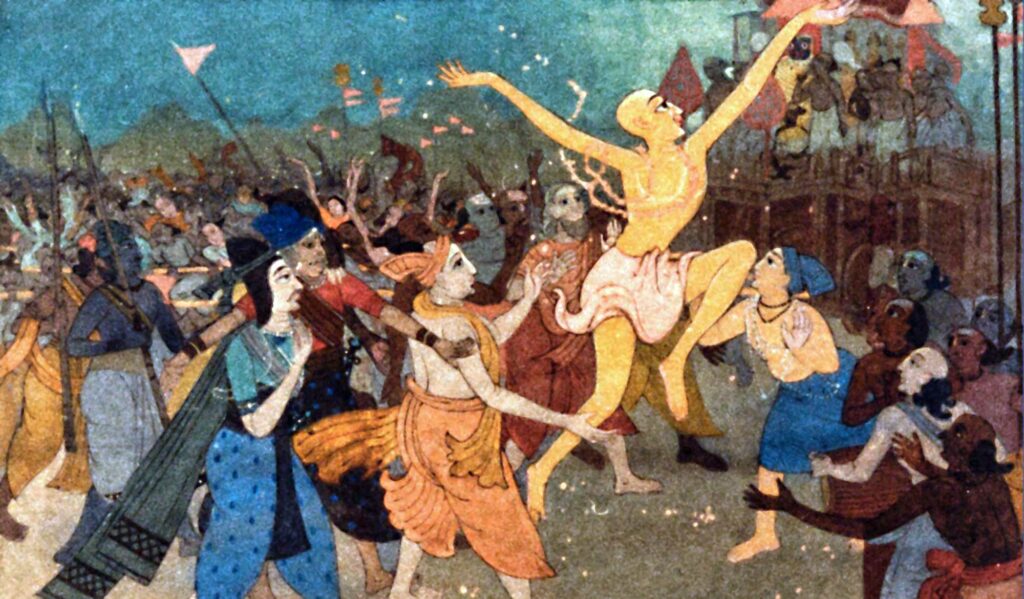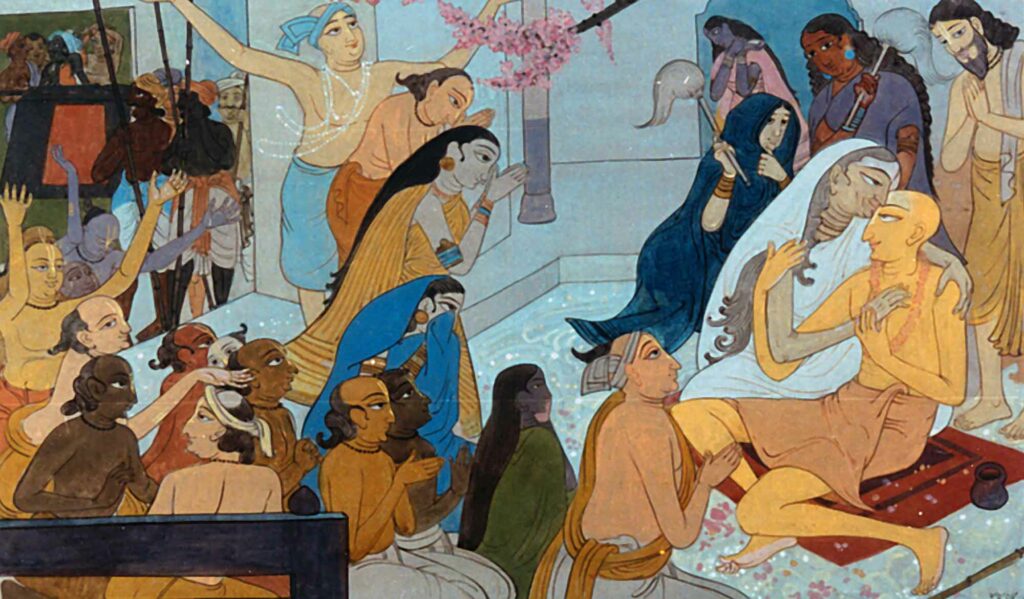Overview
In this article 'Bhakti Siddhānta (Devotional Conclusions)' Śrīla Bhaktisiddhānta Sarasvatī Ṭhākura delineates the foundational elements of bhakti (sambandha, abhidheya and prayojana) drawn from the vedic conclusions and establishes the Śrīmad Bhāgavatam as the ripened fruit of these literatures. This article was originally published in Bengali in Vol. 21, Issue 10 of Śrī Sajjana Toṣaṇī, January 1919 and translated by Sanātana Dāsa.
In the Vedic Literature three divisions are delineated. On the basis of qualification or eligibility, Vedic literature is divided into three sections. From the propensity of enjoying fruitive activities, the process of karma-kāṇḍa manifests. From the propensity of renouncing the fruits of action, the inclination for jñāna-kāṇḍa arises. Feelings arising out of worldly entanglements have given rise to these two different paths. The perception of liberation pertaining to the world beyond found in these two paths cannot be held in high regard. The inclination identified with the conception of liberation is in fact the path of bhakti (devotion) or the upāsanā-kāṇḍa of the Vedas. Strong faith in worldly affairs leads to the misconception of thinking that the spiritual upāsanā-kāṇḍa is a branch of karma-kāṇḍa. All the realizations of people in this world are fruitively oriented or based upon temporary dharma. By accepting the path leading to knowledge of Brahman (brahma-vidyā), knowledge of the self (ātma-vidyā) or knowledge of devotion to the Bhāgavata (bhagavata-bhakti-vidyā), the charm of temporary dharma is completely overshadowed. The fruitive activities of this world leading to enjoyment, and knowledge leading to worldly renunciation found amongst common men do not assist the devotional branch of the Vedic literatures. The devotional sections mentioned in the Vedic literatures do not show reverence to karma and jñāna arising from mundane social knowledge. The twofold Vedic paths of karma and jñāna are incapable of serving the Eternal Reality (akṣara-vastu). To be situated in these two aforementioned branches and to simultaneously believe that one is situated in the branch of devotion is simply a symptom of self-deception. By taking shelter of aparā-vidyā (the mundane knowledge of this world) one will never gain realization of parā-vidyā (the transcendental knowledge of devotion). Devotion is beyond the realm of material nature. Those who are inclined to serve the mundane elements of this world, live their lives endeavoring in activities of the mundane plane.
Siddhānta, or devotional conclusions, means to be established on the stage of perfection after eliminating our previous phase of conditioning. Great personalities, who worship the path of devotion, say that the Vedic literatures have assisted in revealing the three devotional conclusions of sambandha, abhidheya and prayajona.
Vedic brāhmaṇas, who are expert in the branch of fruitive activities, are aware of their connection with their individual karma, and thus they attempt to execute auspicious activities and attain perfection in obtaining the fruits of their sense-gratification. By the potency obtained from pleasing the Supreme Lord Hari, those Vedic brāhmaṇas who are expert in the branch of empirical knowledge, develop oneness in relation to the non-differentiated Brahman by perfecting the six-fold path – they practice and follow the mundane path of jñāna and attain the perfection of eliminating their self after annihilating the ignorance of duality.
Vedic brāhmaṇas who are followers of the branch of bhakti establish their individual transcendental relationship by engaging in eternal process of devotional service to Kṛṣṇa (nitya-abhidheya) and as a result achieve love for Kṛṣṇa. The Vedic literatures have described the science of sambandha, abhidheya and prayojana. Vedic brāhmaṇas worship the Vedic literatures by either engaging in karma with the desire to enjoy the fruits of their action, or by cultivating jñāna and renouncing the result of their actions or, by renouncing both by cultivating devotional service. The prime reason for the difference in understanding and conceptions amongst the brāhmaṇas on the path of karma and jñāna is that they do not agree on the essential devotional conclusion of the Vedas. Due to lack of pure knowledge before one renounces the knowledge of non-duality while accepting the ignorance of the concept of duality, one develops faith in the existence of the other two branches of the Vedas, namely the realm of materialistic knowledge and the realm of renunciation. But when one becomes experienced in proper conclusions one comes to realize the futility of the two branches of karma and jñāna in the realm of transcendence.
Śrīmad Bhāgavata is the ripened fruit from the desire-tree of Vedic literature. In order to specifically make the upāsanā-kāṇḍa of the Vedas beneficial for the qualified followers of the Bhāgavata, the book form of the nāmātmika-mūrti of Bhagavān (the form that is composed of the Lord’s Holy Names) has manifested. In this book, which is the ripened fruit of Vedic literature, the dry, bitter taste of jñāna and the stale taste of karma have been deprived of all respect. When the Vedic brāhmaṇas following karma and jñāna understand the true purport of the Vedic literature, then the beauty of the Śrīmad Bhāgavata will be revealed to them and they will abandon their own merchandise. The confidential explanation of the Śrīmad Bhāgavata has been revealed in the conduct of Śrīman Mahāprabhu.
The crest-jewel of sāragrāhi Vaiṣṇavas (those devotees seeking the essence of devotion), the emperor amongst the community of great brāhmaṇa paramahaṁsas who are expert in the devotional branch of the Vedas, who is considered to be one of the foremost associates in the eternal pastimes of the Lord, Śrī Śrīmad Kṛṣṇa Dāsa Kavirāja Gosvāmī Mahodaya, propagated the foundational secrets of the Śrīmad Bhāgavata introduced by Śrī Gaura in his Śrī Caitanya-caritāmṛta and described the characteristics of Śrī Caitanyadeva who revels in divine pastimes. In that Veda he has written:
siddhānta baliya citte nā kara alasa
ihā haite kṛṣṇe lāge sudṛdha mānasa
One should not become lazy by avoiding discussions on siddhānta, for such discussions strengthen the mind. Thus one’s mind becomes attached to Śrī Kṛṣṇa. (Cc. Ādi 2.117)
If out of laziness one does not enter into the fundamental Vedic principles of sambandha, abhidheya and prayojana, then it will be impossible to attain the proper qualification to enter the realm of devotion to the Lord and become established there. Without properly understanding bhakti-siddhānta, one will become bewildered and claim that the paths of karma and jñāna found in the Vedas are actually bhakti. Thus, after rejecting the path of devotion, thinking it to be strewn with thorns, one will conclude that the other two paths are actually paths leading to bhakti. The rituals conducted by a person inexperienced in devotional conclusions fall into the domain of karma and jñāna and are thus completely rejected by Vedic brāhmaṇas who have taken shelter under the branch of bhakti.
That most intimate associate of Śrī Mahāprabhu, Śrī Śrīmad Sanātana Gosvāmī is the bhakti-siddhānta-ācārya (the ācārya of devotional conclusions) for the Lord’s servants. This topic has been clearly explained in the book Śrī Caitanya-caritāmṛta. After becoming most expert in bhakti-siddhānta, Śrīmad Rūpa Gosvāmī Prabhu wrote an unparalleled book entitled Hari-bhakti-rasāmṛta-sindhu. This book is the very life of the devotees. Due to the gradual neglect of the transcendental message of the Vedas, the present day Vedic brāhmaṇas that have taken shelter of the branch of bhakti have allowed mundane contaminations to enter them.
For the benefit of the society of pure devotees, Śrī Jīva Gosvāmī Prabhupāda, under the guidance of Śrī Rūpa Gosvāmī Prabhu, has clearly explained the fundamental principles of sambandha-jñāna in the first four Sandarbhas of his Ṣaṭ Sandharbha. He is the sambandha-tattvācārya of devotional conclusions.
Under the guidance of Śrī Rūpa and being the recipient of the mercy of Śrī Dāmodara-svarūpa, Śrī Śrīmad Raghunātha Dāsa Gosvāmī Prabhupāda, whose writings like Stavāvalī and other transcendental literatures have presented the proper conception of the knowledge of abhidheya, is eternally established as the abhidheya-tattvācārya under the essential conclusions of devotion.
The section of the Vedas representing pure devotion has been presented under the guidance of Śrī Rūpa. It is not necessary that the karmīs, who are overwhelmed by various desires, or the jñānīs attain benefit from such preaching. If the rays of light emanating from the proper siddhānta enlighten those who are qualified, then the Vedic brāhmaṇas who have taken shelter of the division of bhakti will be able to firmly establish themselves again under the branch of the Vedas and will become capable of making true followers of Śrī Rūpa. At present, the Gauḍīya Vaiṣṇava society, which should ideally be under the bhakti-siddhānta, is madly dancing the tāṇḍava-nṛtya (the dance of death) due to the influence of śūdras who have deviated from the Vedic path. It is our earnest prayer that the pure devotees who follow the precepts of Śrī Rūpa Gosvāmī (Rūpānugas) preach the bona-fide conclusions of devotion to the people of this world and help them become qualified to worship on the path of Vedic Vaiṣṇava dharma.
Related Articles & Books
- Bhakti Siddhānta (Devotional Conclusions) by Śrīla Bhaktisiddhānta Sarasvatī Ṭhākura
- Kṛṣṇa – The Supreme Vedāntist by Śrīla A.C. Bhaktivedānta Swami Prabhupāda
- Gītā-Govinda of Jayadeva Gosvāmī by Śrīla Bhakti Gaurava Narasiṅgha Mahārāja
- Gīta Govinda Revisited by Śrīla Bhakti Gaurava Narasiṅgha Mahārāja
- The Literalist by Śrīla Bhakti Gaurava Narasiṅgha Mahārāja
- Advaita Prakāśa Reviewed by Swami B.V. Giri
Further Reading
- An Assembly to Preserve the Bhakti Śāstra by Śrīla Bhaktivinoda Ṭhākura
- Śrī Dayānanda Sarasvatī and the Tantra Śāstra by Śrīla Bhaktivinoda Ṭhākura
- The Essence of the Ten Foundational Principles by Śrīla Bhaktivinoda Ṭhākura
- Śrīmad Bhāgavatam Daśa Mūla by Śrīla Bhaktivinoda Ṭhākura
- Śrī Caitanya-caritāmṛta Daśa Mūla by Śrīla Bhaktivinoda Ṭhākura
- Āmnāya Daśa Mūla by Śrīla Bhaktivinoda Ṭhākura
- Bhagavad-gītā Daśa Mūla by Śrīla Bhaktivinoda Ṭhākura
- The Secret of the Lord’s Appearance According to the Gītā by Śrīla Bhaktivinoda Ṭhākura
- The Vedānta Philosophy by Śrīla Bhaktivinoda Ṭhākura
- Philosophical Treatise by Śrīla Bhaktivinoda Ṭhākura
- The Bhagavat – It’s Philosophy It’s Ethics and It’s Theology by Śrīla Bhaktivinoda Ṭhākura
- Preface to Śrī Kṛṣṇa Karṇāmṛta by Śrīla Bhaktivinoda Ṭhākura
- Introduction to Śrī Kṛṣṇa Vijaya by Śrīla Bhaktivinoda Ṭhākura
- A Question and Answer Concerning Śrī Kṛṣṇa Saṁhitā by Śrīla Bhaktivinoda Ṭhākura
- Vedānta Śāstra by Śrīla Bhaktivinoda Ṭhākura
- ‘Śrī Muralī Vilāsa’ by Śrīla Bhaktivinoda Ṭhākura
- Samālocana (A Critique) by Śrīla Bhaktivinoda Ṭhākura
Prema Dhāma Deva Stotram with the Narasiṅgha Sevaka Commentary – Verses 61-65
In verses 61 to 65 of 'Prema Dhāma Deva Stotram', Śrīla Śrīdhara Mahārāja narrates the pastime of Śrī Caitanya at Caṭaka Parvata In Purī and explains how the scriptures produced by Brahmā and Śiva are ultimately searching for the personality of Mahāprabhu who is merciful too all jīvas, no matter what their social position.
Prabhupāda Śrīla Sarasvatī Ṭhākura’s Visit to Ayodhyā
With the forthcoming observance of Śrī Rāma Navamī, we present 'Prabhupāda Śrīla Sarasvatī Ṭhākura’s Visit to Ayodhyā' written by Śrīla Bhaktisiddhānta Sarasvatī Ṭhākura Prabhupāda from The Gaudīyā magazine, Vol 3. Issue 21/ In December 1924, after visiting Benares and Prāyāga, Sarasvatī Ṭhākura visited the birth-site of Śrī Rāmācandra in Ayodhyā.
Śaraṇāgati – The Only Path to Auspiciousness
In this article, 'Śaraṇāgati - The Only Path to Auspiciousness', Dhīra Lalitā Dāsī analyses the process of śaraṇāgati (surrender) beginning with śraddhā (faith). She also discusses the role of śāstra and the Vaiṣṇava in connection with surrender.
Ātma Samīkṣā – The Value of Introspection
In this article, "Ātma Samīkṣā – The Value of Introspection" Kalki Dāsa highlights the importance of introspection in the life of a devotee and especially in relation to the worldly environment that surrounds us. He also explains how transcendental sound influences our capacity to introspect.
Prema Dhāma Deva Stotram with the Narasiṅgha Sevaka Commentary – Verses 61-65
In verses 61 to 65 of 'Prema Dhāma Deva Stotram', Śrīla Śrīdhara Mahārāja narrates the pastime of Śrī Caitanya at Caṭaka Parvata In Purī and explains how the scriptures produced by Brahmā and Śiva are ultimately searching for the personality of Mahāprabhu who is merciful too all jīvas, no matter what their social position.
Prabhupāda Śrīla Sarasvatī Ṭhākura’s Visit to Ayodhyā
With the forthcoming observance of Śrī Rāma Navamī, we present 'Prabhupāda Śrīla Sarasvatī Ṭhākura’s Visit to Ayodhyā' written by Śrīla Bhaktisiddhānta Sarasvatī Ṭhākura Prabhupāda from The Gaudīyā magazine, Vol 3. Issue 21/ In December 1924, after visiting Benares and Prāyāga, Sarasvatī Ṭhākura visited the birth-site of Śrī Rāmācandra in Ayodhyā.
Śaraṇāgati – The Only Path to Auspiciousness
In this article, 'Śaraṇāgati - The Only Path to Auspiciousness', Dhīra Lalitā Dāsī analyses the process of śaraṇāgati (surrender) beginning with śraddhā (faith). She also discusses the role of śāstra and the Vaiṣṇava in connection with surrender.
Ātma Samīkṣā – The Value of Introspection
In this article, "Ātma Samīkṣā – The Value of Introspection" Kalki Dāsa highlights the importance of introspection in the life of a devotee and especially in relation to the worldly environment that surrounds us. He also explains how transcendental sound influences our capacity to introspect.








